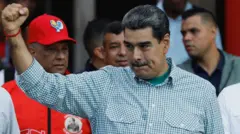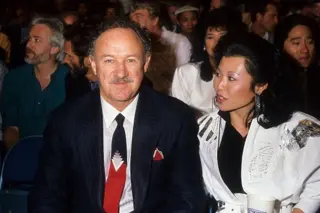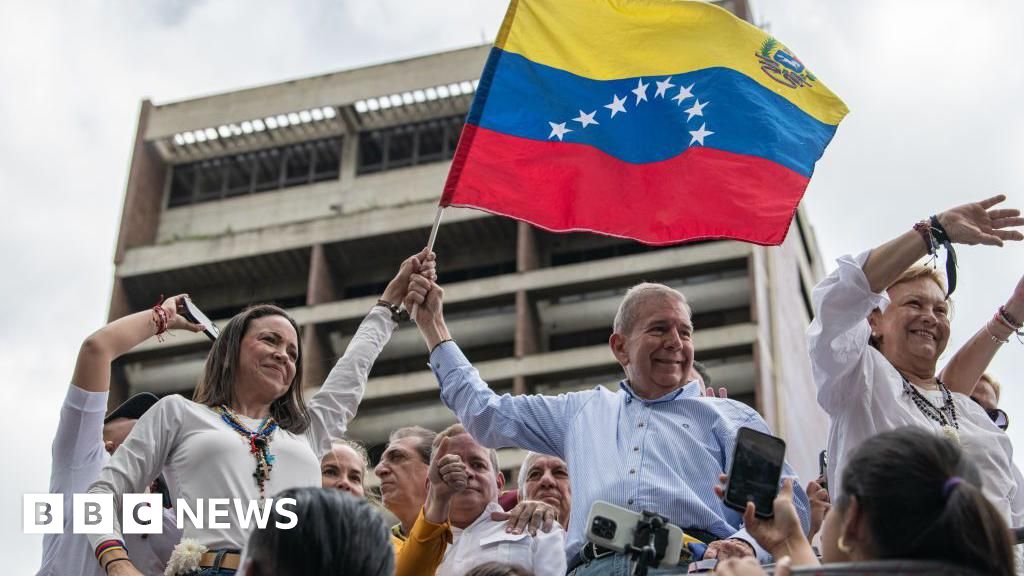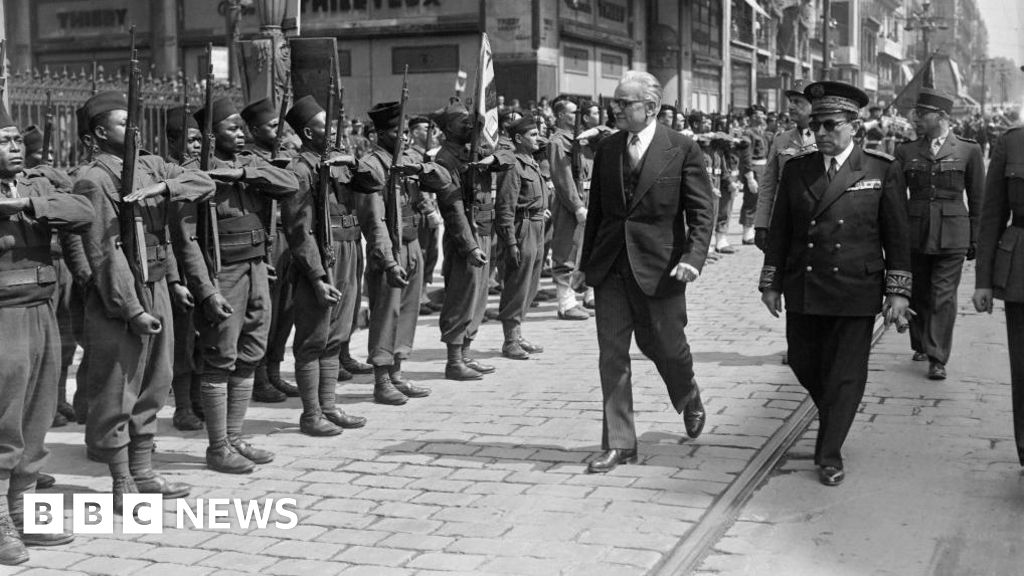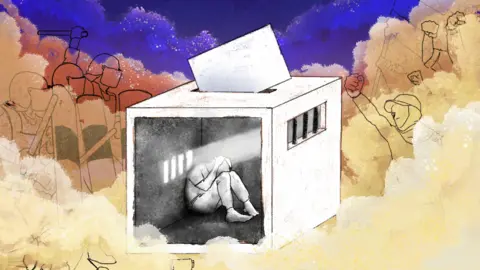 Daniel Arce-Lopez/BBC
Daniel Arce-Lopez/BBC“They have already tortured me and repressed me, but they will not silence me. My voice is the only thing I have left.”
This is how Juan, a young man aged around 20, begins his story. He alleges he was physically and psychologically tortured by Venezuelan security forces after being detained in connection with the presidential elections on 28 July.
He was one of many hundreds of people arrested during protests after the electoral authorities – which are dominated by government loyalists – announced that the incumbent, Nicolás Maduro, had won.
The National Electoral Council (CNE) did not make the voting tallies public and the Venezuelan opposition has described the official result as fraudulent, pointing out that the voting tallies it got hold of with the help of election observers suggest an overwhelming victory for its candidate, Edmundo González.
Juan was released from prison in mid-November, days after Maduro called on judicial authorities to “rectify” any injustices in the arrests.
The BBC spoke to him via video call. For his own safety, we have decided to withhold some of the details of his case and have changed his name.
The young man alleges that many of the detainees are mistreated, given “rotten food” and that the most rebellious are locked up in “torture chambers”.
He showed the BBC documents and evidence that corroborate his story, which coincides with other testimony and with the complaints of non-governmental organisations.
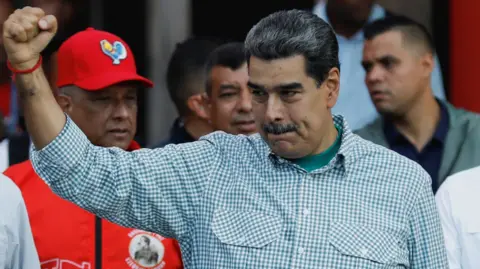 Reuters
ReutersJuan, an anti-government political activist, says the election campaign and the days leading up to the election were “marked by hope” and many people were keen to vote for change.
But the announcement of Maduro’s victory shortly after midnight that Sunday turned what for many was a celebratory mood into confusion and anger.
Thousands of Venezuelans took to the streets to protest against a result they decried as fraudulent.
The opposition and international organisations say what followed was police repression which caused the deaths of more than 20 protesters.
Maduro and some of his officials in turn have blamed the opposition, the “extreme right” and “terrorist” groups for the deaths.
Gonzalo Himiob of Venezuelan non-governmental organisation Foro Penal says people were arrested for as little as “celebrating the opposition’s declaration of Edmundo González as the winner, or for posting something on social media”.
“We also have cases of people who were not even protesting, but for some reason they were near a protest and they were arrested,” he added.
Juan says that is what happened to him.
‘It felt like a concentration camp’
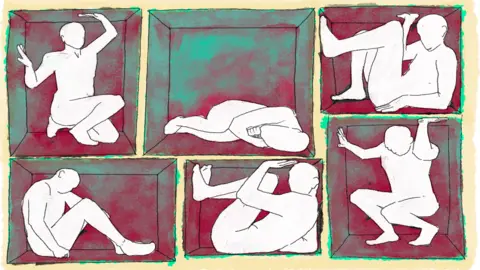 Daniel Arce-Lopez/BBC
Daniel Arce-Lopez/BBCThe young political activist says he had been running an errand when a group of hooded men intercepted him, covered his face and beat him, accusing him of being a terrorist.
“They planted Molotov cocktails and petrol on me, and then took me to a detention centre,” he continued.
He was held in a prison in the interior of Venezuela for several weeks until he was transferred to Tocorón, a notorious high-security prison about 140km south-west of the capital, Caracas.
There he would go through what he describes as the worst experience of his life.
“When we arrived at Tocorón, they stripped us, beat us, and insulted us. We were forbidden to raise our heads and look at the guards; we had to lower our heads to the floor,” Juan recounts.
Juan was assigned a small cell measuring three metres by three metres, which he had to share with five other people.
There were six beds arranged in three bunk beds, and in one corner there was a septic tank and “a pipe that served as a shower”. That was the bathroom.
“In Tocorón I felt more like I was in a concentration camp than in a prison,” says the young man. He describes the beds as “concrete tombs” with a very thin mattress.
“They tortured us physically and psychologically. They wouldn’t let us sleep, they were always coming to ask us to get up and line up,” he explains.
“They would wake us up around 05:00 to line up behind the cell. The guards would ask us to show our passes and numbers.”
He adds that at around 06:00 they would turn on the water for six minutes so they could bathe.
“Six minutes for six people and just one shower, with very cold water. If you were the last one there and you didn’t have time to take off the soap, you were left covered in soap for the rest of the day,” he says.
Then, he adds, they waited for breakfast, which sometimes arrived at 06:00 and other times at 12:00.
Dinner was sometimes at 21:00, and sometimes at 02:00.
“Apart from waiting for meals, there was nothing else to do. We could only walk around inside the small cell and tell stories. We also talked about politics, but in low voices, because if the guards heard us, they would punish us.”
‘I thought I was going to die’
Juan says that many of his fellow inmates were depressed and acted like zombies.
“They gave us rotten food – meat scraps like you would give to chickens or dogs or sardines that had already expired.”
Some detainees were routinely beaten or made to “walk like frogs” with their hands on their ankles, he says.
He describes “punishment cells” where those considered the most rebellious would be sent, or those who dared to talk about politics or ask to make a phone call to relatives.
Juan says that he had been in one of the punishment cells in Tocorón, and that he had only received one meal every two days.
“It’s a very dark cell, one metre by one metre. I was very hungry. What kept me going was thinking about all the injustices that were happening and that one day I would get out of there,” he says.
Another torture cell is known as “Adolfo’s bed”, Juan says, named after the first person who died there.
“It’s a dark, oxygen-deprived room the size of a vault. They put you in there for a few minutes until you can’t breathe and you faint or start banging on the door in desperation. They put me in there and I lasted just over five minutes. I thought I was going to die,” he recalls.
Reports of crimes against humanity
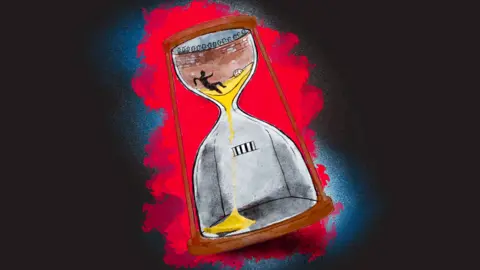 Daniel Arce-Lopez/BBC
Daniel Arce-Lopez/BBCThe young man says that in this prison, inmates have 10 minutes to exercise outside three times a week, but many just stay in their cells.
Foro Penal’s Gonzalo Himiob describes the conditions in Tocorón as “deplorable” and says that detainees’ fundamental rights, such as having access to a lawyer of the detainee’s choosing, are being violated.
“They all have public defenders – the government knows that if it allows access to a private attorney who is not a public official, he or she can document all the due process violations that are occurring.”
In October, United Nations (UN) experts reported serious human rights violations committed in the run-up to the presidential election and during the protests that followed, including political persecution, excessive use of force, enforced disappearances and extrajudicial executions by state security forces and related civilian groups.
The International Criminal Court (ICC) is currently investigating the Venezuelan government for possible crimes against humanity.
The Venezuelan government denies the accusations and says this investigation “responds to the intention of instrumentalising the mechanisms of international criminal justice for political purposes”.
The BBC requested an interview with the Public Prosecutor’s Office about the allegations of mistreatment and torture of detainees, but had not received a response by the time of publication.
‘I’m no longer afraid of the government’
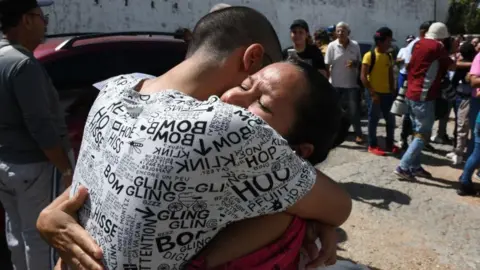 Getty Images
Getty ImagesJuan was released in November, but according to Foro Penal’s figures, there were still 1,794 political prisoners in Venezuela as of 30 December.
According to Juan, many of those detained in Tocorón have pinned their hopes on one date: that of the presidential inauguration on 10 January 2025.
It is the day that opposition candidate Edmundo González, who has been living in exile in Spain, has said that he will return to Venezuela and take up office as president.
He bases his claim to the presidency on official voting tallies the opposition managed to gather with help of election observers.
These tallies, which amount to 85% of the total, have been uploaded to a website and reviewed by independent observers who say that they suggest an overwhelming victory for González.
On Tuesday, US President Joe Biden met González and called him the “true winner” of the Venezuelan election.
However, it is not clear how González, for whom the authorities have issued an arrest warrant, plans to enter Venezuela or who would swear him in given that the National Assembly is dominated by Maduro loyalists.
Nevertheless, Juan says that the prisoners held in Tocorón are hoping against hope that Friday will see a change of government and their release from jail.
Meanwhile, the Maduro government has labelled any talk of a political transition as “a conspiracy” and has threatened that anyone who backs a change of leader “will pay for it”.
Juan admits feeling a certain sense of guilt for being free when hundreds of his “comrades are still suffering” in prison.
But he says he is determined to return to the streets to show his support for Edmundo González on 10 January.
“I no longer fear the Venezuelan government,” he explains.
“They already accused me of the worst crimes, such as terrorism, even though I’m just a young man who has done nothing more than love his country and help those around him.”
“I’m not afraid,” Juan repeats, before admitting that he has left some written testimony in a safe place “in case something happens to me”.
Illustrations by Daniel Arce-Lopez.
